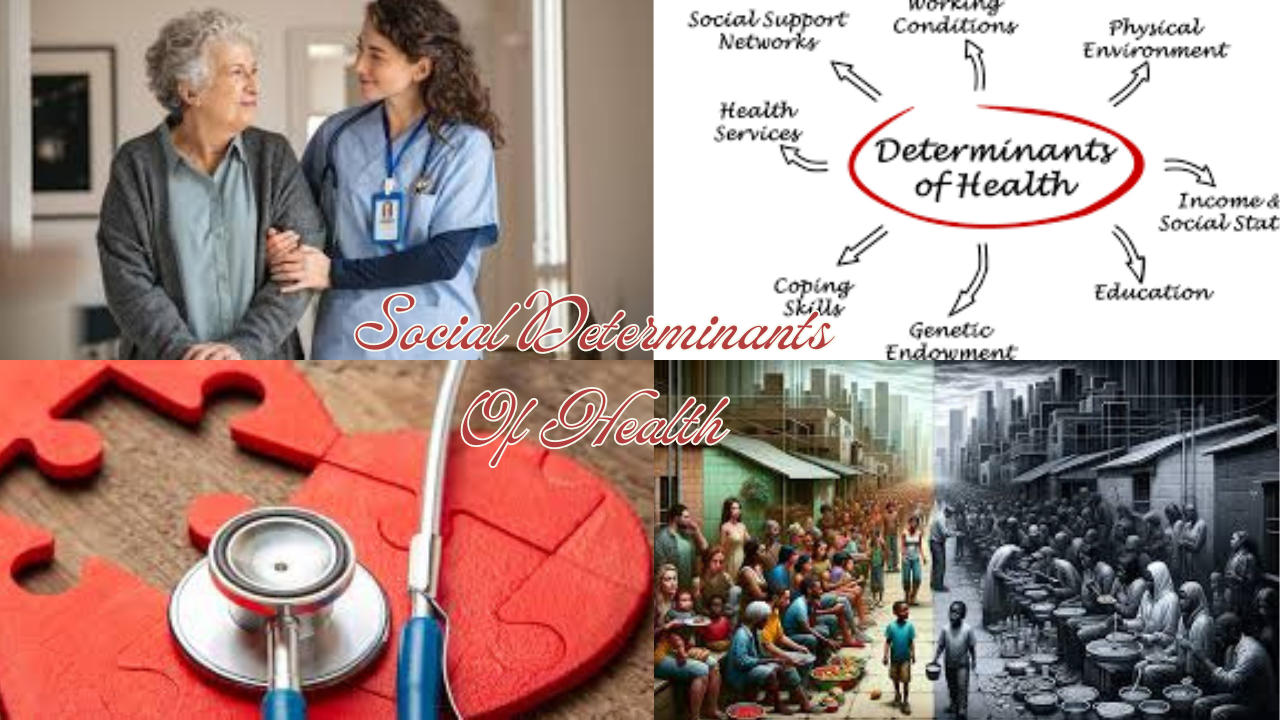Table of Contents
ToggleUnderstanding Social Determinants of Health
Social determinants of health (SDOH) are important variables that affect people’s and communities’ quality of life. Numerous social, economic, and environmental variables that affect general health outcomes and lead to health disparities are included in this group of determinants. We may endeavor to create societies that are healthier and more equal by comprehending and addressing these determinants.
What Are Social Determinants of Health?
The terms “social determinants of health” refer to the conditions in which individuals are born, develop, live, work, and age. The allocation of resources, power, and money at the international, national, and local levels shapes these circumstances. They include:
- Economic Stability
- Employment
- Income
- Expenses
- Debt
- Medical bills
- Support
- Education Access and Quality
- Literacy
- Language
- Early childhood education
- Vocational training
- Higher education
- Health Care Access and Quality
- Health coverage
- Provider availability
- Provider linguistic and cultural competency
- Quality of care
- Neighborhood and Built Environment
- Housing
- Transportation
- Safety
- Parks
- Playgrounds
- Walkability
- Social and Community Context
- Social integration
- Support systems
- Community engagement
- Discrimination
- Stress
The Impact of Social Determinants on Health
The impact of social determinants on health is profound. These factors can affect both physical and mental health outcomes in various ways. Let’s explore how each determinant influences health:
Economic Stability
One important factor influencing health is financial stability. People who have steady employment are more likely to be able to afford wholesome food, safe housing, and medical treatment. On the other hand, those who are unemployed or have unstable finances frequently have higher stress levels and are more likely to develop health problems like heart disease, diabetes, and mental health disorders.
Education Access and Quality
Education is closely linked to health outcomes. Access to better healthcare and healthier lifestyles is made possible by greater education, which frequently results in better work prospects and higher income. Education also empowers individuals with the knowledge and skills needed to make informed health decisions.
Health Care Access and Quality
To maintain good health and avoid disease, one must have access to high-quality healthcare services. Healthcare barriers can result in untreated medical issues and higher rates of morbidity and mortality. Examples of these barriers include inadequate provider networks, lack of insurance, and poor quality of care.
Neighborhood and Built Environment
The physical environment where people live can significantly affect their health. Neighborhoods that are resource-rich, safe, and clean promote physical activity and lower the incidence of chronic illnesses and injuries.. In contrast, poor housing conditions, lack of green spaces, and unsafe neighborhoods can contribute to negative health outcomes.
Social and Community Context
Participation in the community and social ties are essential for overall health and wellbeing. Robust social support systems have been shown to lower stress, boost mental well-being, and increase resilience to life’s setbacks. However, prejudice and social isolation can have a negative impact on one’s health, increasing the chance of death and causing anxiety and sadness.
Addressing Social Determinants of Health
Addressing the socioeconomic determinants of health through thorough and coordinated efforts is essential to improving health outcomes. Strategies may include:
- Policy Interventions
- Implementing policies that promote economic stability, such as minimum wage laws and job training programs.
- guaranteeing fair access to high-quality medical care and education.
- Improving neighborhood conditions through urban planning and community development initiatives.
- Community-Based Programs
- Supporting community health initiatives that provide resources and services to underserved populations.
- Promoting social cohesion and community engagement through local organizations and networks.
- Health Care System Changes
- Enhancing provider training on cultural competence and social determinants of health.
- Integrating social services with healthcare delivery to address patients’ comprehensive needs.
FAQs About Social Determinants Of Health
Q: What are examples of social determinants of health?
A: Social determinants of health encompass a range of factors, such as neighborhood and built environment, economic stability, the social and community framework, and the availability and quality of healthcare.
Q: How do social determinants affect health?
A: Social determinants affect health by influencing the conditions in which people live and work. These factors can impact access to resources, exposure to risks, and overall lifestyle, thereby affecting physical and mental health outcomes.
Q: Why are social determinants of health important?
A:Understanding social determinants of health is important because it helps identify the root causes of health disparities and guides the development of strategies to improve health equity and outcomes across different populations.
Q: How can the socioeconomic determinants of health be addressed?
A: Addressing social determinants of health requires coordinated efforts across multiple sectors, including policy interventions, community-based programs, and changes within the healthcare system. It involves promoting economic stability, ensuring access to quality education and healthcare, improving neighborhood conditions, and fostering social support networks.







